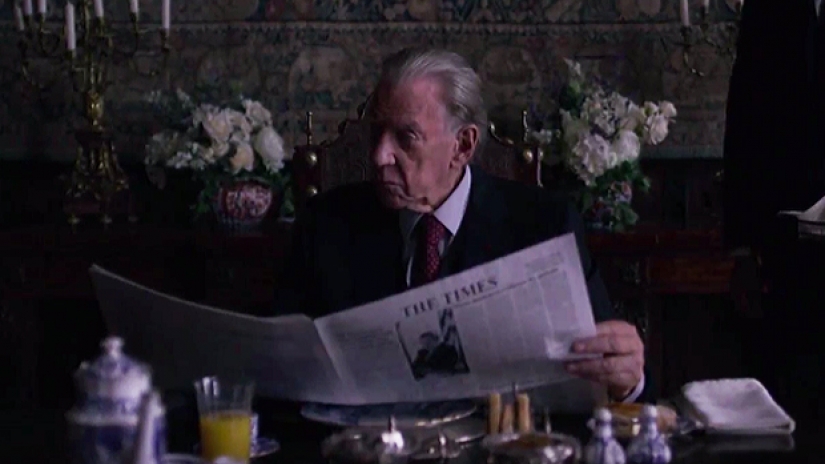Trust Episode 1 Review: The House of Getty
FX's Trust, centered on the 1973 kidnapping of John Paul Getty III, is a dark, funny, and stylish addition to the true crime cannon.
This Trust review contains spoilers.
Trust Episode 1
O.J. did it. American Crime Story: The People v. O. J. Simpson is squarely responsible for TV’s sudden reinterest and boom in series centered on famous true crime tales. FX scored a hit with its melodrama retelling of the Simpson trial, but did so because that story had so much to say about America: our media, our race issues, our obsession with celebrity, and our flawed justice system. FX’s second stab, The Assassination of Gianni Versace, failed to capture the zeitgeist in the same way simply because the subtext wasn’t as rich.
Now the network tries again with Trust, the second high-profile retelling of the 1973 kidnapping of teenager John Paul Getty III, heir to the Getty family fortune, after Ridley Scott’s much publicized (for the wrong reasons) All the Money in the World. Similar to Assassination, I fear the show’s lack of an engaging thesis beyond “rich people are awful” will fail to turn Trust into essential viewing, but it’s evident in the pilot that the show has its strengths.
Created by Simon Beaufoy and director Danny Boyle, the pair that brought you Slumdog Millionaire and 127 Hours, Trust is a brutal family drama with a wicked sense of humor and style. The show is anchored by Donald Sutherland as billionaire patriarch John Paul Getty (from here on out, we’ll refer to the elder Getty as Getty and the younger one as John, capisce?), oozing contempt for his “idle, perfumed wasters” of children, all unsuitable to be the heir of the family fortune. Getty’s fortune is derived from a “spider’s web” of assets, and that web keeps everyone, from relatives, staff, and the harem of women he houses at his estate, caught no matter how despicable Getty may be. Everyone is simultaneously on edge yet eager to please.

Sutherland is fantastic as the old scrooge, so cheap that he bemoans the uptick in the price of the New York Times. He has so much miserly energy that he steamrolls every scene partner as if they were caught reaching a hand into his pocket. His presence is only outmatched by Boyle’s, who directs the pilot with his signature flair. Peep the opening tracking shot, where a camera dives from out of the air into a swimming pool, then emerges from the water and sweeps across a decadent party, or the overhead shots of John running through the streets of Rome, aping the look of the director’s 28 Days Later. Having an eye like Boyle’s on-hand to keep things crackling visually is the real embarrassment of riches.
The episode begins with the horrifying suicide of George Getty, the only apparent heir to the family business. When Getty hears of the loss, he doesn’t mourn the death of a child, but curses the fact he’s being forced to select another heir. His sons, especially former drug addict John Jr., are disappointments that have either removed themselves from consideration by choice or action, clearly in a response to their cold, yet pampered upbringing. At the funeral for George enters John, brought back to Sutton Place to ask for money after getting in trouble with the Italian mafia in Rome.
John instantly impresses his grandfather with his interest in fine art and Getty quickly sees John as a potential successor. After giving him a tour of the oil rig and explaining their tax-free status, Getty agrees to help John with his debts if John commits to working on the rig for six months to learn the business. When John’s father, John Jr., learns that he’s being cut out of the picture once again, he sabotages his son’s chances by revealing a racy photo spread featuring John and his apparent wild lifestyle. Getty coldly sends John packing back to Rome without the money to pay his debts, where trouble is waiting. The sins of the father spill over onto a new generation.
The pilot serves to mostly clue you into how this spiteful little family operates. The women in the harem live in jealous co-dependency, the Getty children happy to hide in their father’s long shadow, and Getty’s butler spends his days as an unfortunate spectator to all of the spiteful madness. However, despite the table setting, I appreciated the pilot taking the time on a long gag that saw Getty’s girlfriend’s unhappily awaiting a new member of their harem only to discover that Getty was actually talking about a tiger all along.
The pilot’s shortcomings are only its most obvious moments. Do we really need the characters making reference to King Lear to see the allusion, and using “Money” as a music cue? Ugh, really? Still, those are small things in an otherwise confident and well-executed debut. I’m excited to see Brendan Frasier and Hilary Swank in upcoming episodes, already inspiring Hollywood comeback stories, and the pilot’s unconventional angle that Paul staged the kidnapping and it all went wrong. That being said, I’m curious to see if Trust has anything deeper to say about wealth and 20th century greed, or if it intends on making greater parallels to our current day and age. We’re exhuming the Getty family’s unhappy history yet again, let’s trust there’s a good reason.
